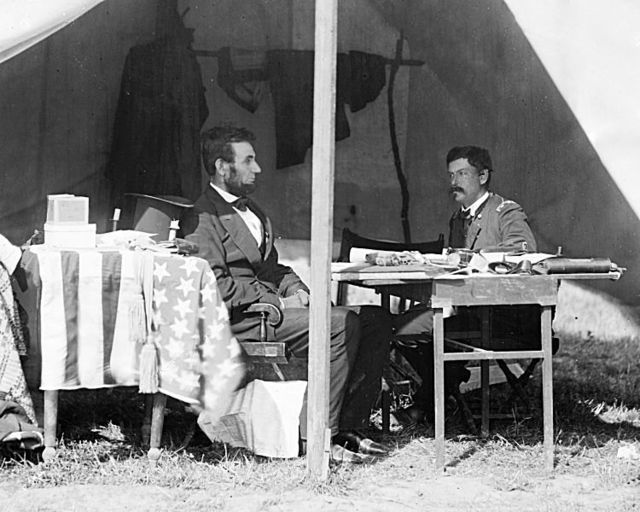
At the risk of being accused of being the old man shouting, “get off my lawn”, the US military has abandoned the tradition of promotion by merit in favor of promotion by “equity”, and not the Webster’s Dictionary version. From our earliest tradition in fighting the British to the sands of the Middle East, the weak have been weeded out and incompetent commanders fired and replaced. Certainly, there are exceptions to this rule, but you can find limitless examples. It is unclear exactly when the US military strayed from our tradition, but the endless wars of Iraq and Afghanistan, or the weak leadership of the Obama era, seem likely places to search.
Many of the Continental Army’s commanders came from the British Army, whose commissions were bought. The wealthy raised their commands with private funds. But this tradition quickly went by the wayside with the initial failures of the Continental Army in battle with the British. Had the American army not moved to removed incompetent command, the war would have been lost. As an example, after the fall of New York’s Fort Ticonderoga, in July 1777, Major General Philip Schuyler was relieved and accused of dereliction of duty. Later, Horatio Gates, who was sent to command American forces in the south, was routed by the British at the Battle of Camden in South Carolina, and he too was relieved. These were but a few examples.
The tradition continued in the Civil War. There are numerous examples of poor leadership, particularly at the beginning of the war, but the worst of all was General George McClellan, from whom Lincoln and the Union expected great things. McClellan was a superb organizer, a West Point-trained engineer who did much to build the Union army almost from scratch. But he was overly cautious by nature. Lincoln's pleaded for aggressive action, but McClellan convinced himself that the Confederate armies outnumbered him despite superior resources in the North.
World War I was no different. US commanders were untested and entered the war against forces that had vast experience. Pershing relieved at least six division commanders and two corps commanders during World War I. This was not limited to senior commanders; he removed around 1,400 more junior commanders from combat positions.
Pershing’s understudy, General George C Marshall, helped prepare the US military for World War II. He eliminated deadwood in the officer corps from top to bottom. Marshall’s forced in to retirement or discharged 31 colonels, 117 lieutenant colonels, 31 majors, and 16 captains from the active-duty force in the summer and fall of 1941. In addition, some 269 National Guard and Army Reserve officers were let go. Marshall estimated that, as chief of staff, he forced out at least 600 officers before the United States entered World War II.
American involvement in World War II began in infamy with the attack on Pearl Harbor. The commanding officer of Pearl was an imminently qualified naval officer, but Admiral Husband E Kimmel was fired ten days after the attack. This disaster happened under his command, and he was held accountable.
One of America’s most successful generals in World War II was General Douglas MacArthur. He commanded forces in Korea, and led the infamous victory at Inchon, but when he failed to obey President Truman’s commands and defied him in public, he was unceremoniously fired. The primacy of civilian control over the military was established in the most public way possible, something we would see eroded during the Trump Administration.
While Vietnam reversed the tradition of promoting competent leaders, at least at the highest levels of the military, Operation Desert Storm announced the success of the professional army and warrior class. Great leaders like General (Ret) Norman Schwarzkopf, then Commander US CENTCOM, and General (Ret.) Chuck Horner, then Lieutenant General and US CENTCOM Air Commander, brilliantly commanded US and allied forces to a sweeping victory. The victory seemed to validate the idea of a professional army that erased the memory of our failures in Vietnam.
Unfortunately, subsequent conflicts in Afghanistan and Iraq, the endless wars, have exposed the weakness of a professional standing army. Our Founding Fathers were fearful of a standing army, and in every conflict from the Revolutionary War to Vietnam, we had to rebuild and conscript citizens into the army. With more complex weapons, this became a serious drawback which resulted in the decision to transition to a volunteer, professional army. With a standing army at its disposal, Democrat war hawks and Neocons have been able to wage endless wars without having to answer to the American public, they volunteered after all. These endless wars repeated the same politicization of senior military leadership. Those senior officers were promoted to leadership positions, more often on their political stance than competence.
President Obama replaced competent military leaders with men like General (Ret) Lloyd Austin who reflected the president’s political ideology. General Austin oversaw the withdrawal of US and allied forces in 2011 that led to the rise of ISIS. The president infamously referred to ISIS as a “jayvee team”. Thousands would suffer under their cruel regime and thousands more would die. Another political officer, General Mark Milley, would rise in rank. The later was promoted by President Trump, who could later come to regret his decision, and the former would become Secretary of Defense, under President Biden. The combination of those two would lead to the disastrous Afghanistan withdrawal, the loss of 13 US Marines and soldiers, and like Iraq withdrawal, the creation of a safe haven for terrorists.
Maybe more critically than the loss in Afghanistan, General Mark Milley directly defied the lawful orders of the Commander in Chief during the fateful last days of the Trump Administration. He went so far as to contact Communist Chinese leaders to “assure them” he would not obey any orders from President Trump to launch nuclear weapons. The damage this has caused to the idea of civilian control, established in the Constitution, and reaffirmed by President Truman, is untold.
Should this control not be reestablished by future administrations, we could face an army that is willing to act in contravention to lawful commands, or worse, against the American people. President Biden, and the Democrat controlled Congress, seem willing to use National Guard forces to forcibly protect their regime, as evidenced by their response to the events of January 6th. Washington DC was effectively under martial law.
The next generation of officers from the military academies are being taught that diversity, equity, and inclusion are more important than competence. Those rising in rank are being promoted using those same metrics. Senior leaders are commanding their subordinates to live by those principles. Before long, the entire military will be infected with this ideology. Time is running short to reverse these destructive policies and return to the tradition of promotion through competence. Our next conflict will expose these critical mistakes and lead to loss of life and potentially the loss of our independence. Our enemies could not care less about social justice. We need warriors and competent leadership or face defeat.
A USAFA grad, Brent flew F-15 combat missions during Operation Desert Storm. After completing his service, Brent immigrated to Israel, where he was drafted into IAF active service.
























